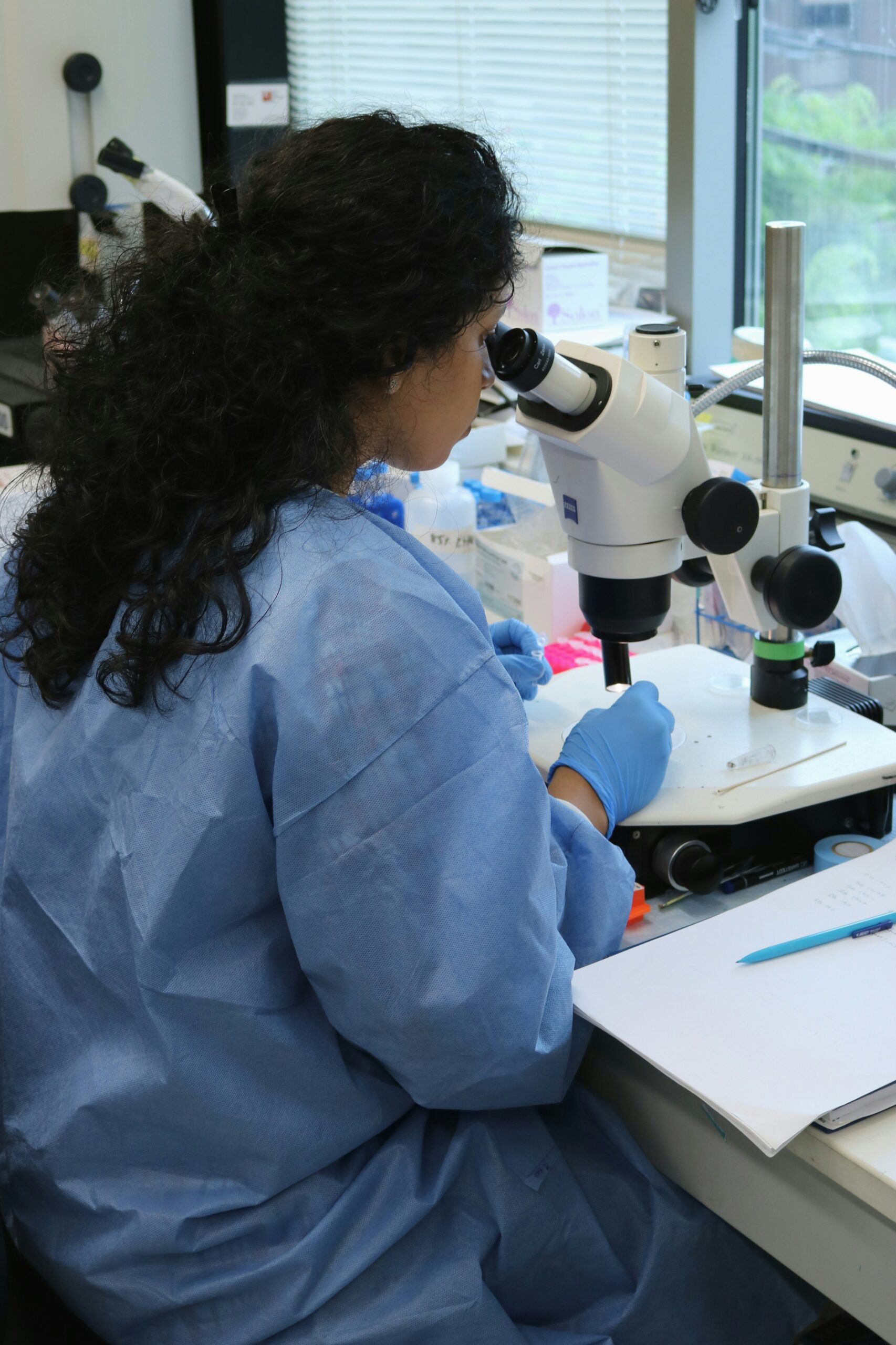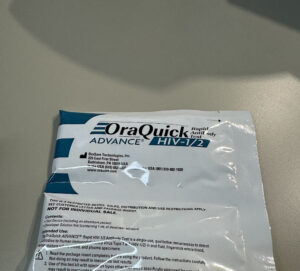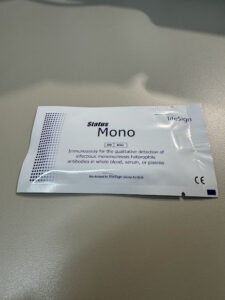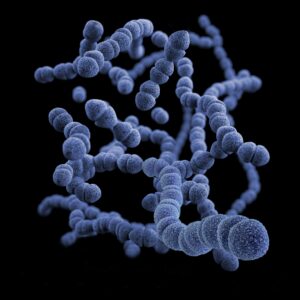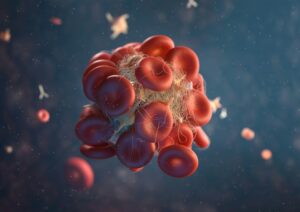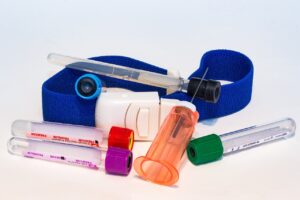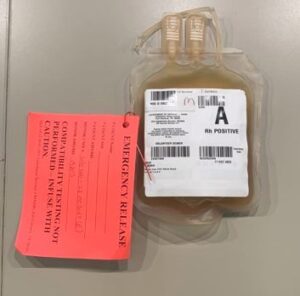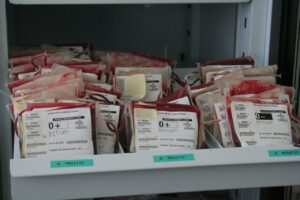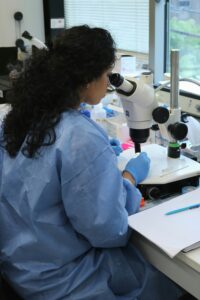
Published: 18 December 2023
The laboratory career field is very diverse and gives opportunity to work in a variety of areas.
Daily Duties & Opportunities
The majority of lab techs work in a clinical role in either a hospital or clinic. In a smaller facility, work is usually as performed as a generalist, where techs run samples in all sections instead of just one. In large hospital settings, a section will usually be specialized in, due to the complexity of testing and volume of tests required. Common sections include:
Chemistry
This area runs testing of various chemical analytes using methods like spectrophotometry and immunoassays. Common panels are the Comprehensive Metabolic Panel (CMP), Basic Metabolic Panel (BMP), Lipid Panel, Liver Panel, Kidney Function, Thyroid Panel, Blood Gases, Electrolytes and a number of other individual tests depending on the size and type of hospital.
Hematology
The key areas of emphasis for hematology testing is to determine cellular constituents of whole blood. This can help diagnose various types of conditions like anemia, cancer and hemoglobinopathy. The most common automated test is the Complete Blood Count (CBC). Common manual methods include the Manual Differential, Erythrocyte Sedimentation Rate (ESR) and Sickle Cell screen.
Urinalysis
Also known as “UA”, is where urine samples undergo manual or automatic dipstick testing for chemical analysis. Microscopic analysis is also done in order to quantify white blood cells, red blood cells, bacteria, crystals and the motile STD parasite Trichomonas.
Coagulation
This monitors the status of clotting disorders by testing levels of clotting factor proteins in the blood. Tests like Prothrombin Time (PT), Activated Partial Thromboplastin (APTT), International Normalized Ratio (INR), Factor VIII, D-Dimer. These can help diagnose excessive bleeding conditions as well as excessive clotting.
Microbiology
“Micro” enables the identification of microbes which cause infections. This includes bacteria, parasites, viruses and fungi. Typical workflow involves inoculating agar plates, incubation, colony morphology, biochemical testing and antimicrobial susceptibility. Although many areas in the clinical lab have become highly automated over the years, microbiology is one of the sections which remains dependent on a lot of manual testing methods.
Transfusion Service
Also known as the “Blood Bank”, is where blood components like Red Blood Cells, Fresh Frozen Plasma (FFP), Platelets and Cryoprecipitate (Cryo) are stored. The blood bank tech is responsible for pre-transfusion testing, issuing of components, transfusion reaction investigations and inventory management. Transfusion Services is widely considered the highest stress section to work in the laboratory due to the tedious nature of the work as well as the potentially fatal consequences of any mistakes. If a tech makes a mistake during testing or issuing units, a blood recipient could possibly die from a transfusion reaction. This is a big reason for the persistent high turnover rate and manpower shortage in many blood bank sections.
Specimen Processing
This is the area responsible for receiving specimens from outside sources and distributing to the appropriate sections for testing. Daily tasks include logging in specimens, rejecting unacceptable specimens, delivering to sections, processing of ship-out tests and specimen collection. Specimen Collection can comprise both inpatient collection of specimens (ward rounds) and/or outpatient collection. Unlike other sections, most positions are not required to be filled by MLT or MLS, rather they are typically filled by phlebotomists and lab assistants. This is due to the fact that testing is not performed in this section. The technical supervisor position is frequently an exception to this and is often filled by an MLS.
Point of Care
Also known as “POCT”, is the name given to any lab testing which is not performed by laboratory personnel. The main lab should have a POCT coordinator who acts as a liaison with external departments and is responsible for oversight of testing by these non-laboratory personnel like nurses, respiratory therapists, etc. The POCT coordinator ensures that quality control and calibration is performed on devices at designated intervals. They also ensure that proficiency testing (CAP surveys) are ordered for each department and results are input and tracked in accordance with appropriate timelines. The position of POCT coordinator is more of a management role and less of a “testing personnel” role.
Cytology
Cytotechnology is a subset of the clinical laboratory which falls under Anatomic Pathology, as opposed to Clinical Pathology. This job is not held by MLTs or MTs, but rather by Cytotechnologists (CTs). They go to a totally separate school which is highly specific to the screening of cells, primarily those of the “Pap Smear”. The main objective is to screen for any potentially cancerous cells and forward to a pathologist if necessary for confirmation/diagnosis. Therefore, the majority of a cytotechnologist’s day is spent working with a microscope.
Histology
Also known as “Histo”, is another subset of the lab which falls under Anatomic Pathology. There is a separate school for Histology Technologists and Technicians, but the work can also be performed by MLTs and MTs if they are appropriately cross-trained. Histology involves the processing of biopsies so that they can be put onto a slide for viewing by a pathologist. During the “grossing” procedure, a pathologist or pathologist assistant cuts a biopsy specimen into smaller pieces, before putting into a processor that dehydrates the tissue. The histo tech then takes the tissue and embeds it into paraffin wax, before cutting it razor thin with a microtome into strips that are ~5 um thin. These thin cross-sections are then stained and cover slipped before being delivered to a pathologist for reading. Histology involves a lot of manual intervention and little automation.
Molecular
Molecular Pathology is a newer frontier in the clinical lab and involves the analysis of specimens at the molecule level, mostly that of RNA and DNA. Also known as Polymerase Chain Reaction or (PCR), this discipline of testing is popular in forensic analysis and gained even more wide use during the COVID-19 pandemic. Molecular testing is often referred to as the “future” of testing due to its wide use potential, both in anatomic and clinical pathology.
Career Roles In The Laboratory
Technical Supervisor
Once a tech has worked for several years and gained experience, they can be eligible to fill the role of Technical Supervisor of a section. The Tech Supervisor is in charge of technical, operational and administrative oversight of a given section as well as mentorship of all junior techs within the section. They are in charge of schedules, evaluations, review of QC and patient results, oversight of equipment maintenance, training, competency assessment and proficiency testing. They are also in charge of any sort of validation as well as ordering supplies and major end item equipment once they are ending their useful life cycle.
Laboratory Manager
Once a Technical Supervisor has filled the role for a number of years, they may be promoted to the role of Laboratory Manager if a position opens up. The Lab Manager is normally the most tenured lab tech for a facility and has usually been working in the lab for 20 years or more. The Lab Manager’s main focus is on big picture issues like budgeting, manpower, personnel issues, presiding over meetings and working groups, as well as working through their team of Tech Supervisors.
Education

Degree requirements for lab techs require undergraduate college coursework in the sciences. MLTs undergo 2-year programs and MTs must graduate from 4-year programs.
The Army, Navy and Air Force are the exception, as they have accelerated programs which are 12 months long, consisting of 6 months of didactic coursework and 6 months of clinical rotations.
If one aspires to get into a Lab Manager role, a masters degree in healthcare administration or an MBA is usually required.
Certification
There are two nationally accrediting bodies which certify laboratory professionals in the United States. American Medical Technologists (AMT) and American Society for Clinical Pathology (ASCP). ASCP is considered the gold standard in the United States and is the agency which employers often prefer or mention in their job listings . However, I have noticed that AMT is more popular with techs living outside of the United States, or who have come here from other countries.
Certification is a requirement for many jobs. MLT And MLS are the two most common certifications sought after overall. Additionally, ASCP offers “Technician”, “Technologist” and “Specialist” certifications which focus on specialties like chemistry, hematology, blood bank and microbiology.
Every certification requires the completion of Continuing Education Units (CEUs) in order to remain current. 36 CEU hours are required to be submitted every 3 years, or the certification will lapse.
There are currently 10 states which require laboratory personnel to be licensed (California, Hawaii, Florida, New York, North Dakota, Tennessee, Louisiana, Nevada, West Virginia, and Montana). Puerto Rico also requires licensure1.
Job Security
The laboratory field has a strong outlook for the next decade and beyond. The BLS projects that MLT and MLS employment is projected to grow 5 percent from 2022 to 2032, faster than the average for all occupations. About 24,000 openings are projected each year, on average, over the decade2.
One reason for this growth is due to the retirement of the “Baby Boomer” generation. The void being left by them has been leaving many vacancies open. This has left many facilities with critical staffing shortages and more opportunities for younger techs to step into a position. Many employers are even offering sign-on and retention bonuses in order to attract talent.

The retiring Baby Boomer generation is also beginning to need more medical care in their old age. This requires more visits to the doctor and therefore, more lab testing. A strong workforce of laboratory professionals will be necessary in order to support this increase in demand.
The advances in automation over the years have caused worry regarding job security for many in the field. Undoubtedly, this has had an effect on staffing numbers. However, with the dynamics of the aging boomer population previously mentioned, a shortage of qualified staff will still remain into the future.
Lab Tech Salary in 2024

The salary of lab techs can vary widely depending on many factors. Whether you are an entry-level MLT or a seasoned MLS can make a huge difference. Education, years of experience and location are other key elements. But for a tech that has been in the field for a while, the quickest way to boost your income level is by taking a supervisory role. Your salary at this point will usually be commensurate with the number of subordinates that you have under your supervision.
MLT
The average MLT salary in the United States is $48,890, but typically falls between $43,890 and $54,5903.
MLS
The average MLS salary in the United States is $59,452, but typically falls between $53,520 and $65,0404.
Laboratory Supervisor
The average Laboratory Supervisor salary in the United States is $83,408, but typically falls between $71,545 and $93,9195.
Laboratory Manager
The average Laboratory Manager salary in the United States is $117,624, but typically falls between $103,309 and $133,2326.
Travel Tech
Travel techs often get paid more than with traditional roles. Typical assignments are 13 weeks long and many pay $2,000-$3,000 per week. Aya and Vivian Health are a couple of the main firms which employ travel techs. Travel assignments are lucrative, but require a lot of time away from home. Consequently, this line of work is best suited for single people with no spouse or children at home.
What Else Can You Do With A Lab Background?
The majority of lab techs will work most of their career performing testing in some sort of health care facility. However, there are other career paths that our background prepares us for outside of the traditional role.
Tech Support
When analyzers malfunction, sometimes tech support for the equipment manufacturer needs to be called to walk through the problem. If you have a lot of patience, good oral communication and strong problem- solving skills, this can may be a good career for you. The drawback is that you have to spend most of the day on the phone.
Field Service Rep
Field Service Rep: If there is an issue that tech support cannot fix over the phone, a Field Service Representative (FSR) may be dispatched to perform maintenance on a piece of equipment. This work is for those that enjoy equipment maintenance and the principles of mechanics and electronics. A major drawback is that it requires frequent travel through a regional area of responsibility.
Sales
Sales: a medical sales representative manages accounts for existing clients and seeks out new accounts in their target market. Companies like Roche, Siemens, Sysmex or Beckman Coulter to name a few, are good examples of places a lab tech’s technical background could be useful in communicating with customers, since these companies specialize in the manufacture of analyzers that are used for testing. Once an account is established with a facility, the sales rep maintains open lines of communication with clinical leadership to ensure that all needs continue to be met. The goal is for the facility to experience maximum satisfaction with the product and to continue renewing the contract with the same company year after year. If you have a knack for the business side of things and strong interpersonal skills, this could be of interest to you. Being a medical sales rep can be very lucrative, especially if you have large accounts under you. A drawback though is that it does require some travel in order to meet with prospective clients and existing customers.
Academia

Lab techs have a strong background in the sciences, so teaching is another possible career path. This could include either teaching science in high school or college or teaching in a lab program in college. If you enjoy teaching and mentoring people, this could be extremely rewarding. However, one drawback is that the pay may be on the lower end of the spectrum.
Military
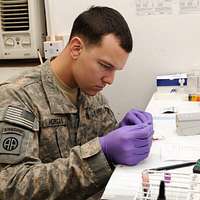
The Army, Navy and Air Force all have career opportunities for lab techs. Each service has slightly different ways of operating, but all of them offer a lot of benefits to anybody that’s up to the challenge. Some major benefits include free attendance to lab school, guaranteed job placement, chances to travel the world, free healthcare, retirement after serving for 20 years and a heavy emphasis on leadership training. Some drawbacks include frequent time away from your family, conflict between military obligations and patient care requirements as well as work-life balance.
Conclusion
The lab tech career field has solid wages and job security that should continue to strengthen thru the next decade. There is a clear path for upward mobility for those that stay in the traditional clinical setting, however, lateral movement to other related areas is a very viable option. Working as a lab tech is a great career choice for those that enjoy science and for those that want to have an impact on patient care.
References
1. Personnel Licensure. (2023). Retrieved from The American Society for Clinical Laboratory Science: https://ascls.org/licensure/
2. Occupational Outlook Handbook. (2023, September 14). Retrieved from Bureau of Labor Statistics: https://www.bls.gov/ooh/healthcare/clinical-laboratory-technologists-and-technicians.htm#tab-6
3. Medical/Clinical Laboratory Technician I Salary in the United States. (2023, November 27). Retrieved from Salary: https://www.salary.com/research/salary/alternate/medical-clinical-laboratory-technician-i-salary
4. Medical Laboratory Technologist I Salary in the United States. (2023). Retrieved from Salary: https://www.salary.com/research/salary/listing/medical-laboratory-technologist-i-salary
5. Laboratory Supervisor Salary in the United States. (2023). Retrieved from Salary: https://www.salary.com/research/salary/benchmark/laboratory-supervisor-salary
6. Laboratory Manager Salary in the United States. (2023). Retrieved from Salary: https://www.salary.com/research/salary/benchmark/laboratory-manager-salary

